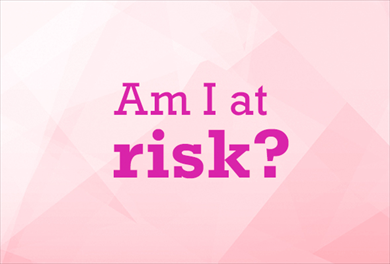Breast Cancer Risk Factors | Are You At Risk For Developing Breast Cancer?
Breast Cancer Risk Factors. Are You At Risk?
There is no way to prevent breast cancer, however knowing your risks, can help decrease your chance of developing breast cancer. There are several risk factors that put women at risk for developing breast cancer. Some of these risk factors are hereditary and can not be modified, while there are some that can be modified. Moreover, changing those risk factors that can be changed can decrease your chance of developing breast cancer tremendously.

Breast Cancer Risk
Nonmodifiable Risk Factors
Being a Female. Though men can also get breast cancer, women are 100 times more likely to diagnosed with breast cancer.
Aging. Most breast cancers occur in women 55 years or older. More and more women are being diagnosed at a younger age.
Early Menstruation/Late Menopause. Starting your menstruation before the age of 12 increases your risk. This is due to having a longer lifetime exposure to estrogen. Likewise, having late menopause also poses a risk for the same reason.
Family History/Genetics. Only 5%-10% of breast cancers are thought to be hereditary. This is caused by genes passed down from a parent to their child. Likewise, 85% of women diagnosed with breast cancer have no family history.
Personal History. Having a previous cancer or radiation treatment to the chest or face, increases a women’s risk for developing breast cancer.
Ethnicity. White women are at a slightly higher risk for developing breast cancer than African American women. African American women, however, are more likely to be diagnosed before the age of 45. Furthermore, African American women are also more likely to die from breast cancer.
Modifiable Risk Factors
Obesity in Older Women. The link between weight and breast cancer risk is complicated. Ovaries, as well as fat tissue produce estrogen. Estrogen is linked to breast cancer. As women age and go through menopause the ovaries stop producing estrogen. Being overweight after menopause means that your fat tissue is still producing estrogen. Staying active, especially after menopause can decrease this risk factor.
Late or No Pregnancy. Unfortunately in some cases this is an unmodifiable risk factor. Nonetheless, the effects of pregnancy can vary for different types of breast cancer.
Taking Hormone Replacement for Greater than 5 years/Oral contraceptives. The risk varies depending on whether it is hormone replacement following menopause or taking oral contraceptives with hormones to prevent pregnancy. Most importantly, the time frame after stopping these hormones affect your risk of developing breast cancer.
Dense breast. Women with dense breast are at an increased risk for developing breast cancer. Dense breasts often make it more difficult to detect breast cancer by mammogram.
Drinking alcohol. Your risk increases with the amount of alcohol consumed. Drinking more than 1 drink per day increases your risk.
This is not an all inclusive list of risk factors as cancer research is ongoing. Some other risk factors with unclear effects on breast cancer include; tobacco smoking, chemicals in the environment, and even working night shift. Knowing your breast cancer risk is very important. Regardless of your risk, everyone should be screened for breast cancer. Early detection is the key to survival. Breast cancer can affect anyone, as it crosses racial and social barriers. No one is immune to breast cancer.
- Published in breast cancer, risk factors, Uncategorized
